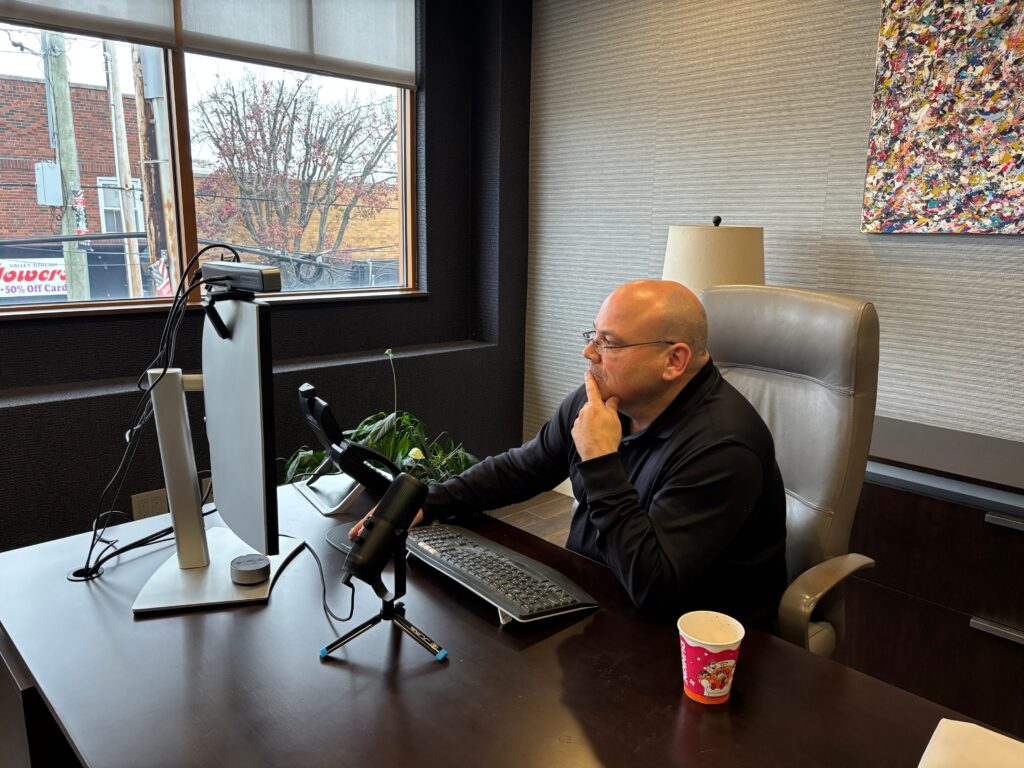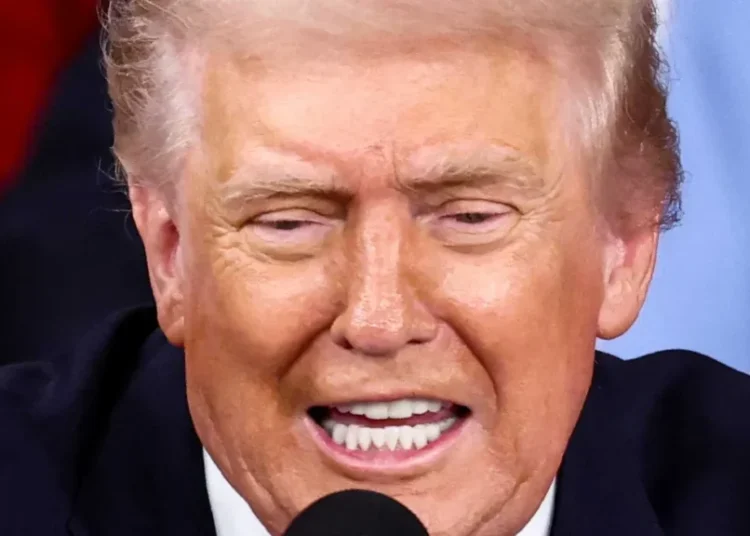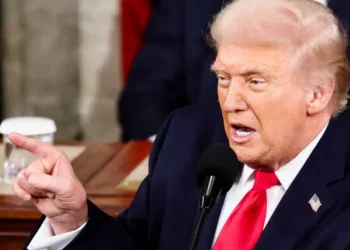VALLEY STREAM, N.Y. — Thanks to President Donald Trump’s ever-changing tariffs, importing merchandise has never been more complicated. That’s where Salvatore Stile II comes in.
Stile is a customs broker, an essential if low-profile position in the world of global commerce that he likens to a combination travel agent, attorney and accountant for goods making their way to the United States.
Trump’s proliferating tariffs have transformed the once-routine task of clearing goods through customs into one that can dramatically affect importers’ bottom line. After 31 years of largely anonymous toil, Stile, 55, is now in the commercial spotlight, helping companies redesign their products to avoid the highest U.S. tariffs and using artificial intelligence to ensure that they don’t blunder into paying the government more than they legally owe.
“This was the ‘aha’ moment. This was an industry where importers looked down on customs brokers. They thought they were guys that made it despite themselves. That has been substantially transformed,” Stile said. “I’ve never seen an environment like this.”
A look at Stile’s operation, Alba Wheels Up, shows how the highest U.S. tariffs in decades work in practice. Along with reshaping supply chains and raising prices, Trump’s extensive system of import taxes is increasing the workload for customs brokers and causing companies to rethink every foreign component in their products.
Completing the digital paperwork that must accompany each shipment is taking longer, as specialists address the many tariffs that might apply. Millions of shipments that previously entered the country without Form 7501, the government’s standard entry document, now require it because of Trump’s decision in August to eliminate a customs exemption for packages worth less than $800.
Daily inquiries from puzzled clients are five times higher today than last year, said Kevin Sola, 42, branch manager of Alba Wheels Up’s New York office.
“The big thing is the constant changes,” he said.
Getting things wrong also carries the risk of civil and criminal penalties under a new enforcement push. The Departments of Justice and Homeland Security have established a joint trade fraud task force aimed at ensuring compliance with the president’s “America First” policy. Earlier this month, federal prosecutors in Newark charged UBS Gold, an Indonesian company, and three of its executives with wire fraud as part of an alleged scheme to evade tariffs on jewelry imports.
Stile, one of more than 14,450 licensed customs brokers nationwide, launched Wheels Up in 1994 in a tough industrial neighborhood in Jamaica, Queens, near John F. Kennedy International Airport. A few years later, he acquired Alba, an older firm, moved to nicer digs and began doing business as Alba Wheels Up.
A plainspoken New Yorker who drives a white Rolls-Royce SUV, Stile last year buttonholed Trump in the men’s room at one of his Florida golf courses for a post-election chat about trade.
“I said, you know, I’d be happy to help, I’m an expert in trade matters. He took my business card and he gave it to [future Commerce Secretary] Howard Lutnick, and I had a meeting a couple weeks later at Trump [campaign] headquarters,” Stile said.
Privately held Alba Wheels Up, which expects revenue of more than $500 million this year, serves major apparel makers such as Vera Wang and food product companies like Botticelli. But it specializes in clearing shipments from the small- and medium-sized businesses that lack the well-staffed back offices of major importers such as Target or Home Depot.
Using AI, Stile can automatically scour an importer’s list of previous shipments, searching for items that were misclassified. A review of more than 10,000 items for one clothing importer found multiple examples where fashion accessories were incorrectly listed as personal care products, which carry higher duties. After petitioning U.S. Customs and Border Protection, Alba Wheels Up recovered $1.3 million for the importer.
Through August, the government refunded nearly $7 billion to importers who overpaid their tariff bills, according to the Treasury Department.
For decades, overall U.S. tariffs were low and predictable. Trump began changing that in his first term, imposing new levies on many Chinese goods, as well as steel, aluminum, washing machines and solar panels. But for many importers, tariffs remained a secondary concern.
“We’ve always counted tariffs as ‘it is what it is.’ It’s been the same number forever. It’s just a fixed cost,” said Steven Lemyre, senior vice president for operations at Core Home, a housewares maker.
That changed on Jan. 20, as Trump returned to the White House and began issuing announcements that sent tariffs soaring and plummeting. The government is now collecting record tariff revenue from importers. This year, the treasury expects to reap about $200 billion in tariffs, six times as much as before the first Trump presidency.
Higher tax revenue for the government means higher stakes for businesses. The increasingly complex tariff code offers opportunities for competitive advantage as well. Companies are poring over their product designs, reducing the discretionary use of materials like stainless steel that are heavily tariffed in favor of alternatives such as plastic that are not.
The increasingly common practice is called “tariff engineering.”
Using an Alba Wheels Up service called “Smart Spec,” Orly Corp., a footwear and apparel supplier, saved on tariffs by altering the design of a women’s platform sandal. Instead of stitching the straps directly into the sole, Orly attached them with a simple post design, said Ruby Antebi, 36, head of strategy and business development for the New York-based company.
The change shifted the product from a footwear category subject to a 26 percent tariff to one that was charged 20 percent.
Orly, which makes goods for brands such as Skechers, Nine West and Aeropostale, began using Alba Wheels Up after learning that its previous customs broker had assigned the wrong tariff code to some of its products, raising its tariff bill.
“We potentially had overpaid in the high six figures,” Antebi said.
Now, he said, the company is using Smart Spec to review “a couple hundred” of its most popular housewares and clothing items to see if similar design changes would provide additional savings.
Today’s bewildering tariff landscape is testing Alba Wheels Up and its competitors. Since January, the president has threatened, imposed, raised, reduced or eliminated tariffs on virtually all U.S. trading partners and several specific industrial sectors. All told, Trump has issued nearly three dozen tariff-related executive orders and proclamations.
Some days have witnessed multiple White House announcements. In April, Trump raised tariffs on Chinese goods to 145 percent before dramatically reducing them less than five weeks later. Even companies that had signed free trade agreements with the United States, such as South Korea, saw their products hit with tariffs.
Some announcements appear to have been driven by presidential pique, making them almost impossible to anticipate.
In late October, Trump vowed to hit Canadian goods with an additional 10 percent levy after being angered by a television ad that the province of Ontario aired featuring President Ronald Reagan’s criticism of tariffs. That measure has not yet been implemented.
In July, the president slapped a 50 percent tariff on Brazilian goods over the prosecution of former president Jair Bolsonaro, an ally, on coup charges. This month, Trump cut tariffs on some Brazilian agricultural products, as well as those from several other Latin American nations, in an anti-inflation move. (Bolsonaro is now serving a prison sentence.)
The often chaotic rollout of tariffs has left businesses scrambling. In August, one of Stile’s clients had just finished shifting his Chinese orders to a new supplier in India when Trump abruptly announced a 50 percent tariff on Indian goods.
To avoid losing millions of dollars on the order, the client shipped its Indian goods to a bonded warehouse in the U.S. By doing so, they can remain in storage and delay clearing customs until the tariffs on Indian goods are reduced, though they incur warehouse fees until then.
Stile’s team has struggled to make sense of new tariffs amid sometimes vague executive orders or conflicting statements from administration officials. The president’s expanded tariffs on industrial metals include a long list of “derivative” products with even tiny amounts of steel or aluminum.
The baffling mix of country and product tariffs, including requirements to determine where component metals were poured or melted, is reflected in numerous industry requests for official clarifications.
So far this month, Customs and Border Protection officials have published nearly 100 official rulings in response to importer inquiries.
A California company wanted to know whether its “Viking Vixen” adult Halloween costume, previously imported on a duty-free basis, was subject to any of the new tariffs on Chinese goods. Yes, CBP replied.
Another manufacturer sought guidance on whether it could claim China or Cambodia as the origin of a 15-piece bath set to be sold in Kohl’s stores. Answer: Each individual item, including the shower curtain, liner, hooks and bath rug, required a separate country of origin and tariff rate.
Aviation headsets from the Philippines. Plumbing equipment made partly in China and partly in Vietnam. A women’s knit blouse from India. The menagerie of goods that manufacturers brought to customs officials for review is nearly endless.
The confusion mirrors what Stile sees in his beige two-story office on Long Island. Some days, hundreds of emails pour in from worried importers. As tariff concerns mushroom, Stile hears directly from CEOs and company presidents rather than his usual supply chain counterparts.
The tariff complexity may get worse: The Supreme Court is expected to issue a ruling as soon as next month that could invalidate the president’s use of emergency powers to impose the bulk of this year’s tariffs.
If it does, the administration has vowed to replace them with new levies, using other legal authorities. That would mean more changes for customs forms — potentially multiple times.
“That’s going to impact importers and brokerage houses immensely, depending on what they decide,” said Sola, Stile’s branch manager. “I’m just thinking about all that work.”
The post Trump’s tariff wars mean booming business for customs brokers appeared first on Washington Post.




